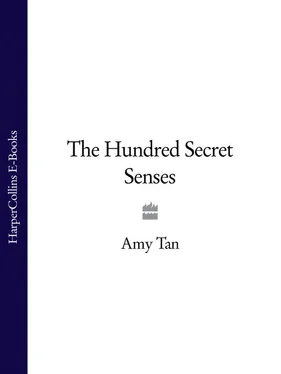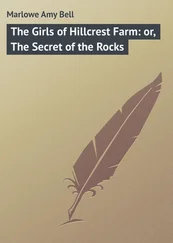I taught her what makes the world a living place: sunrise and sunset, heat and cold, dust and heat, dust and wind, dust and rain.
I taught her what is worth listening to in this world: wind, thunder, horses galloping in the dust, pebbles falling in water. I taught her what is frightening to hear: fast footsteps at night, soft cloth slowly ripping, dogs barking, the silence of crickets.
I taught her how two things mixed together produce another: water and dirt make mud, heat and water make tea, foreigners and opium make trouble.
I taught her the five tastes that give us the memories of life: sweet, sour, bitter, pungent, and salty.
One day, Miss Banner touched her palm on the front of her body and asked me how to say this in Chinese. After I told her, she said to me in Chinese: ‘Miss Moo, I wish to know many words for talking about my breasts!’ And only then did I realize she wanted to talk about the feelings in her heart. The next day, I took her wandering around the city. We saw people arguing. Anger, I said. We saw a woman placing food on an altar. Respect, I said. We saw a thief with his head locked in a wooden yoke. Shame, I said. We saw a young girl sitting by the river, throwing an old net with holes into the shallow part of the water. Hope, I said.
Later, Miss Banner pointed to a man trying to squeeze a barrel that was too large through a doorway that was too small. ‘Hope,’ Miss Banner said. But to me, this was not hope, this was stupidity, rice for brains. And I wondered what Miss Banner had been seeing when I was naming those other feelings for her. I wondered whether foreigners had feelings that were entirely different from those of Chinese people. Did they think all our hopes were stupid?
In time, however, I taught Miss Banner to see the world almost exactly like a Chinese person. Of cicadas, she would say they looked like dead leaves fluttering, felt like paper crackling, sounded like fire roaring, smelled like dust rising, and tasted like the devil frying in oil. She hated them, decided they had no purpose in this world. You see, in five ways she could sense the world like a Chinese person. But it was always this sixth way, her American sense of importance, that later caused troubles between us. Because her senses led to opinions, and her opinions led to conclusions, and sometimes they were different from mine.
For most of my childhood, I had to struggle not to see the world the way Kwan described it. Like her talk about ghosts. After she had the shock treatments, I told her she had to pretend she didn’t see ghosts, otherwise the doctors wouldn’t let her out of the hospital.
‘Ah, keep secret,’ she said, nodding. ‘Just you me know.’
When she came home, I then had to pretend the ghosts were there, as part of our secret of pretending they weren’t. I tried so hard to hold these two contradictory views that soon I started to see what I wasn’t supposed to. How could I not? Most kids, without sisters like Kwan, imagine that ghosts are lurking beneath their beds, ready to grab their feet. Kwan’s ghosts, on the other hand, sat on the bed, propped against her headboard. I saw them.
I’m not talking about filmy white sheets that howled ‘Oooooohh.’ Her ghosts weren’t invisible like the affable TV apparitions in Topper who moved pens and cups through the air. Her ghosts looked alive. They chatted about the good old days. They worried and complained. I even saw one scratching our dog’s neck, and Captain thumped his leg and wagged his tail. Apart from Kwan, I never told anyone what I saw. I thought I’d be sent to the hospital for shock treatments. What I saw seemed so real, not at all like dreaming. It was as though someone else’s feelings had escaped, and my eyes had become the movie projector beaming them into life.
I remember a particular day – I must have been eight – when I was sitting alone on my bed, dressing my Barbie doll in her best clothes. I heard a girl’s voice say: ‘ Gei wo kan .’ I looked up, and there on Kwan’s bed was a somber Chinese girl around my age, demanding to see my doll. I wasn’t scared. That was the other thing about seeing ghosts: I always felt perfectly calm, as if my whole body had been soaked in a mild tranquilizer. I politely asked this little girl in Chinese who she was. And she said, ‘ Lili-lili, lili-lili ,’ in a high squeal.
When I threw my Barbie doll onto Kwan’s bed, this lili-lili girl picked it up. She took off Barbie’s pink feather boa, peered under the matching satin sheath dress. She violently twisted the arms and legs. ‘Don’t break her,’ I warned. The whole time I could feel her curiosity, her wonder, her fear that the doll was dead. Yet I never questioned why we had this emotional symbiosis. I was too worried that she’d take Barbie home with her. I said, ‘That’s enough. Give her back.’ And this little girl pretended she didn’t hear me. So I went over and yanked the doll out of her hands, then returned to my bed.
Right away I noticed the feather boa was missing. ‘Give it back!’ I shouted. But the girl was gone, which alarmed me, because only then did my normal senses return, and I knew she was a ghost. I searched for the feather boa – under the covers, between the mattress and the wall, beneath both twin beds. I couldn’t believe that a ghost could take something real and make it disappear. I hunted all week for that feather boa, combing through every drawer, pocket, and corner. I never found it. I decided that the girl ghost really had stolen it.
Now I can think of more logical explanations. Maybe Captain took it and buried it in the backyard. Or my mom sucked it up into the vacuum cleaner. It was probably something like that. But when I was a kid, I didn’t have strong enough boundaries between imagination and reality. Kwan saw what she believed. I saw what I didn’t want to believe.
When I was a little older, Kwan’s ghosts went the way of other childish beliefs, like Santa Claus, the Tooth Fairy, the Easter Bunny. I did not tell Kwan that. What if she went over the edge again? Privately I replaced her notions of ghosts and the World of Yin with Vatican-endorsed saints and a hereafter that ran on the merit system. I gladly subscribed to the concept of collecting goody points, like those S&H green stamps that could be pasted into booklets and redeemed for toasters and scales. Only instead of getting appliances, you received a one-way ticket to heaven, hell, or purgatory, depending on how many good and bad deeds you’d done and what other people said about you. Once you made it to heaven, though, you didn’t come back to earth as a ghost, unless you were a saint. This would probably not be the case with me.
I once asked my mom what heaven was, and she said it was a permanent vacation spot, where all humans were now equal – kings, queens, hoboes, teachers, little kids. ‘Movie stars?’ I asked. Mom said I could meet all kinds of people, as long as they had been nice enough to get into heaven. At night, while Kwan rattled on with her Chinese ghosts, I would list on my fingers the people I wanted to meet, trying to put them in some sort of order of preference, if I was limited to meeting, say, five a week. There was God, Jesus, and Mary – I knew I was supposed to mention them first. And then I’d ask for my father and any other close family members who might have passed on – although not Daddy Bob. I’d wait a hundred years before I put him on my dance card. So that took care of the first week, sort of boring but necessary. The next week was when the good stuff would begin. I’d meet famous people, if they were already dead – the Beatles, Hayley Mills, Shirley Temple, Dwayne Hickman – and maybe Art Linkletter, the creep, who’d finally realize why he should have had me on his dumb show.
Читать дальше












